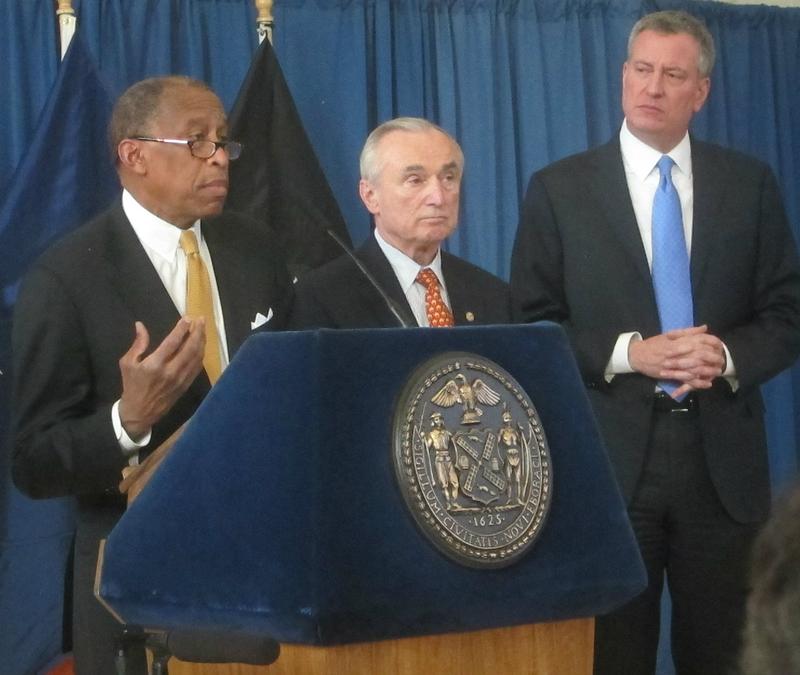
The city announced on Thursday that it will drop the appeal in the class action stop and frisk lawsuits, pending court approval. Mayor de Blasio also said that an agreement had been reached that will allow reforms ordered last August by federal Judge Shira Scheindlin to be implemented.
"We are doing it through a collective commitment to fix the fundamental problems that enable stop and frisk to grow out of control and violate the rights of innocent New Yorkers," he declared.
At the press conference held at a recreation center in Brownsville, Brooklyn, where street stops skyrocketed over the past decade, Commissioner Bill Bratton denounced the Bloomberg administration’s approach to crime fighting without mentioning the former mayor or police commissioner by name. He said stop and frisk had taken a heavy toll not only on the city's youth but also on the officers who were required to make more and more street stops even as crime rates dipped.
"So the two entities, the public and the police… shared a commonality of concern: 'Why me, why more?'” asked Bratton.
While officials were holding the press conference, about two dozens youths waited outside to go back in and use the recreation facilities. When asked if any of them had been stopped and frisked, many of them nodded yes, and one replied "Hell yeah!"

Young men waiting outside of the Brownsville Recreation Center.
The agreement includes an unexpected change from the remedies ordered by the judge --the court-appointed monitor, Peter Zimroth, will be in place for three years rather than an open ended amount of time. In other cities, some police monitors have had their job for a decade or more. Critics have observed that a handful of years may not be enough time to reform the NYPD, the largest police force in the country. But city officials said the amount of time the monitor is in place is contingent upon the city meeting its reform obligations of conducting constitutional stops.
Civil rights attorneys and police reformers expressed guarded optimism about the agreement. Donna Lieberman, the Executive Director of the New York Civil Liberties Union said it was a “step forward” but she noted that the police culture would not change overnight.
Brooklyn Borough President Eric Adams, who testified in the Floyd stop and frisk trial, said the best gauge of success is an improved relationship between the NYPD and the communities of color that have been heavily policed.
"I'm watching to see people walk down the block, see a police officer smile and say, 'hello officer.'” He said that will be a signal that reforms are working.
The largest police union, the Patrolmen’s Benevolent Association, is one of two unions that formally requested that the court allow them to step in and take over the appeal once the de Blasio Administration dropped it. In a written statement released on Thursday, PBA President Patrick Lynch said “We continue to have serious concerns regarding how the remedies will impact our members and the ability to do their jobs." A PBA spokesman added that like all stakeholders, rank and file officers want a seat at the table going forward.
